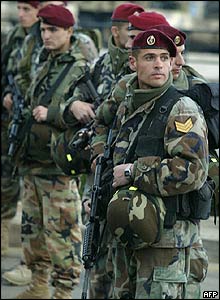Syria Feature: Defecting Military Officers Tell Their Stories (Knickmeyer)
 Some context for this article by Ellen Knickmeyer of The Los Angeles Times --- I suspect the opening anecdote about the tensions in the military over the shoot-to-kill order by the regime followed an incident in April in Baniyas in which 12 troops, including two Lieutenant Colonels, were reportedly killed in an ambush.
Some context for this article by Ellen Knickmeyer of The Los Angeles Times --- I suspect the opening anecdote about the tensions in the military over the shoot-to-kill order by the regime followed an incident in April in Baniyas in which 12 troops, including two Lieutenant Colonels, were reportedly killed in an ambush.
And the latest reference to the defecting sergeant, who left during operations in Jisr al-Shughour in the northwest, should be considered with respect to reports of a battle between the Syrian military and defecting troops that left dozens dead.
Knickmeyer's report should be read alongside the coverage of EA's James Miller this week of the spiralling conflict in Syria, including the apparent increase in defections.
Days before Syrian forces launched a deadly offensive against street protesters in the western city of Baniyas, the colonel leading the attack gathered up six of his officers. The colonel, one of the officers later recounted, put his cellphone on the loudspeaker setting, for all to hear.
The voice of Syria's then-defense minister, Ali Habib, boomed out, providing chilling orders for a crackdown on Baniyas' civilian protesters:
"Any kind of gathering, you disperse it with sheer force. You shoot," the minister said that day in May, recalled a 21-year-old lieutenant in the quwat-al-khassat, or special forces, who said he was one of the six gathered around the colonel's phone.
"And the officer who cannot handle that and disagrees, we will deal with them directly."
The Los Angeles Times spoke to three Syrian military men, all members of the nation's Sunni Muslim majority, who, reached independently, said they fled between May and August to avoid being forced to shoot unarmed civilians, or being shot themselves for refusing.
A fourth Syrian interviewed by The Times identified himself and was identified by one of the other defectors as a first lieutenant in the military intelligence service, or mukhabarat.
Together, their accounts offer insight about the planning and organization behind the deadly offensive that activists, rights groups and Western governments allege Syrian President Bashar Assad's regime has unleashed against predominantly peaceful street demonstrations by citizens demanding governmental change.
The four all said orders to shoot protesters came from top officials and were explicit. Officials of the United Nations and Human Rights Watch say actions of that sort may constitute crimes against humanity.
The men also said that Assad's forces have been augmented in their attacks by Revolutionary Guard forces from Iran and by members of the shabiha, the Syrian civilian militia composed of otherwise unemployed and underemployed men whom the government is said to pay by the day for missions that include shooting at civilians.
Three of the interviews were conducted in person or on the phone in neighboring Lebanon. The fourth, with a man who said he was living in a Syrian town bordering Turkey, was conducted by Skype.
The three Syrian army men — a captain, a lieutenant and a sergeant — produced the same type of salmon-colored military ID cards. The cards displayed their names and photos in uniform, under the emblem "Syrian Arab Republic, General Leadership of the Armed Forces, Administration of Officer Affairs." The sources asked that their names be withheld because they feared retribution.
The sergeant said his last hours of service in the Syrian armed forces came one day in early June, when he and others under the command of a high-ranking Defense Ministry official were sent to the northern town of Jisr Shughur to crush an uprising.
"The town was empty," recounted the sergeant. "We heard the distant voice of a muezzin's call to prayer, and then the chanting of a protest."
"We were ordered to shoot in that direction, without knowing who, and where, we were shooting." Fellow soldiers, he said, "started shooting."
Unwilling to fire on unarmed people, he said he fell back with another soldier, who was from the town and knew the backstreets. Soon, he said, they dropped their guns and were fleeing down narrow lanes past the corpses of civilians, some of them children, in the streets and on doorsteps.
"Usually, there is a whole line of security forces behind our backs" to shoot soldiers who refuse to fire on protesters, the sergeant recounted. "I was lucky to be able to run away."
"When you reach a point where you have to shoot at civilians, when a bullet has to come out of your gun and hit a civilian, then you'll understand how easy a decision it was to run away," he said.
Many other soldiers "share my opinions but are afraid of putting their families at risk," he said. "We are a police state."
All three military men described the planning with which Assad's government allegedly cracked down on civilian protesters.

 Friday, September 9, 2011 at 10:08
Friday, September 9, 2011 at 10:08
Reader Comments